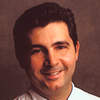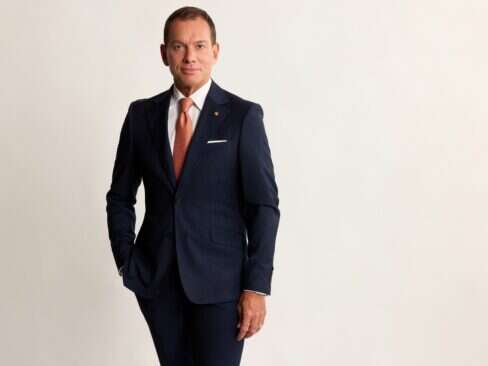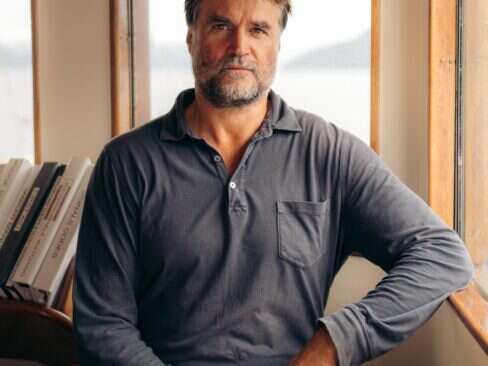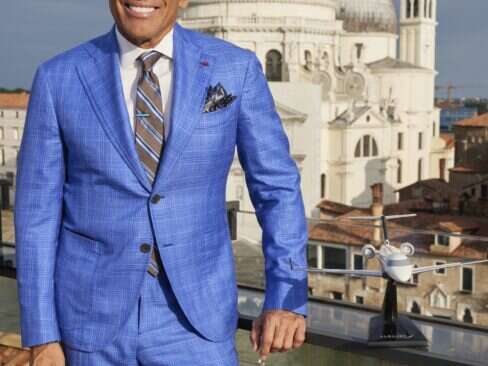
Executive ChefTocqueville and 15 East
Marco Moreira is native of São Paulo, Brazil, trained sushi chef, and owner of a trio of culinary establishments in New York, including the French-American Tocqueville. After working at renown New York institutions like Bouley and Quilted Giraffe, he started the sushi bar at Soho’s Dean & Deluca, founded and still runs Marco Polo Caterers, and most recently, opened 15 East, a contemporary Japanese restaurant. By drawing upon his childhood influences while growing up in South America, Moreira has created dining experiences with very different characters and cuisines, a challenge most chefs shy away from. He has been a leader among restaurants relying on Greenmarket and local food, as well as being involved with several local and national philanthropies. Moreira sat down with Elite Traveler after a recent fundraiser for City Meals on Wheels, which Moreira co-hosted with fellow New York chef Daniel Boulud.
ET: How did you decide you wanted to be a chef?
Marco Moreira: I always loved food. Growing up, we always made a big deal about every meal. Both my grandmothers cooked, and we dined out frequently. I loved the eating aspect, the entertaining aspect, the dining out aspect so it was just a progression of things before I realized it’s what I wanted to do.
I knew I wanted to be in the restaurant business somehow. I had the opportunity to be a manager in a casual restaurant. It got my feet in the door. Then one day, after lunch, my boss, who was the sushi chef, said, ‘You love cooking and you love sushi, so why don’t you let me train you and make you into a sushi chef?’ and I went to work for him. It was my introduction to cooking, literally, even though there isn’t much cooking involved in sushi!
ET: For our readers, can you give me some background?
Marco Moreira: I made sushi from 1983 to 1989, in New York. Then I worked in Chicago, helping them open restaurants. I became a sort of sushi expert, consulting restaurants. I set up the sushi program at Dean & Deluca in Soho when it first opened. I set up a flagship at Harry’s Farmer’s Market in Atlanta– it’s like a Whole Foods. Between all that, I wanted to do more. I wanted to work in French restaurants.
ET: Where are some of the French restaurants where you worked?
Marco Moreira: In New York, at The Mark for 7 years, also Bouley. My first was Regine’s, a brasserie in midtown, very trendy at time, very shi-shi. I got to work right next to the chef. I really passionate about it and really trying to learn the cuisine, reading a lot and cooking at home all the time.
ET: Now, you also have a catering business. Is that while you were working in the French restaurants?
Marco Moreira: Before, during and after.
ET: How does the catering differ from restaurant business?
Marco Moreira: It’s very different in the sense that, when you do catering, it’s always a different situation. You get to see different people. It’s always exciting, because any event could be a wine theme, a birthday party, or a special holiday, or it could be a wedding, anniversary, or a very intimate, romantic Valentine’s dinner for two. So catering becomes a challenge to get into the client’s head and try to figure out what their vision for the event, trying to guide them with your expertise. Ultimately, though, it should be the client’s idea. They come to you for advice, but you really have to read their mind and translate it and make it happen –versus, a restaurant, which is exciting, but definitely more pressure. You don’t necessarily need to plan ahead. You come in and you have this to do – you have lunch, you have 15 on the books, and then maybe someone is sick, so you always have to be on your toes. It’s a different kind of pressure, but that’s the best part. I just don’t think I could do just catering.
ET: Now that you’ve opened 15 East, going back to your Japanese roots, how is running two restaurants simultaneously? Challenges? Perks?
Marco Moreira: It definitely complicates everything to have two restaurants. I’m lucky both are within a few feet so I can go back and forth 20 times a day. You need to be better organized and really translate to the team what needs to happen and keep them focused. You need very good communication and a good relationship with team in terms of keeping a chain of command, so priorities are passed down. And you need to keep people liable for what you are asking of them.
The mantra we try to keep in mind—we talk about it every day in the staff meetings—is that’s it’s always about the customer. They come to us because we are the experts. We’re hear to pamper them, surprise them, and orchestrate a great evening for them. So whatever it takes, that’s what we need to do to make them happy. Different clients expect different things so it’s our job to figure that out. If you’re a captain or a manager or a sommelier or maitre d’, it’s your job to figure out what they really, really want. For instance, maybe a guest can’t decide between two appetizers, so we don’t want to be the one to make the final decision. We will talk to the chef and send the second appetizer as a gift to the guest and let them try both. We don’t tell the guest how they should enjoy themselves, we merely suggest.
ET: How is working with your wife [Jo-Ann Makovitzky]? Do you have to compartmentalize work time with personal time?
Marco Moreira: She’s definitely more in the dining room and I’m more in the kitchen. We definite hash everything out together, but from there, we start going down the chain of command. Also, we help out each other. She’s also a trained chef, so I respect her with the cooking aspect. We built the catering together, we built this together, we are a team. She’s really organized and knows how to get things done. We agree as to what needs to happen, but my strength is more technical and she keeps me focused. She’s so efficient. We’ve had Tocqueville for 10 years and catering well before that. I think we’ve adapted by now and figured out what works for each of us.
ET: Both of your restaurants use Greenmarket [New York’s main farmer’s market] produce. When did you start using Greenmarkets foods with your catering business and restaurants?
Marco Moreira: I used to go the Greenmarket in the 80s, but I think when I went to work for David Bouley, where everything pretty much came from the Greenmarket, is when I really started to take advantage of it. My background of Brazil played a part – every neighborhood has a great farmer’s market, which is similar or bigger, and that’s how you primarily shop for produce, meat and fish. You chose the chicken you think is the cutest and half an hour later, and it’s ready for you in a bag and so fresh. It was always part of my childhood, and I didn’t know how important it was then. It was just normal, but as I’ve moved on to other things, it wasn’t always on my radar. But when I went back to the Greenmarket, it all made sense again. You just can’t have a store bought egg anymore. It’s kinda of like you’re spoiled but chefs are spoiled. We can get the best of the best, anytime of the year, because it comes from somewhere. But at the market, a strawberry doesn’t have to be picked when green and shipped. It will be picked when ripe and fresh and that really influences the taste.
ET: What do you feel about the current state of the restaurant business? What are some trends? How does the economy affect it all?
Marco Moreira: I think that people always appreciate really good food. So what we are trying to do now, because we are known for great ingredients, great cuisine and fine dining, is trying to add something else – we want to make it more playful. We’re going to have a Brazilian night here. People don’t want to necessarily be thinking about all the bad news, so I don’t think the restaurants will change inherently, but we’re trying to sensitive to the economy. The whole hospitality industry is being impacted, so we’re going to go with a more fun atmosphere than just formal. We want it to be a local, neighborhood, special occasion restaurant so by adding this edge—changing the music a bit, the Brazilian night, more bar focus – marketing it fun, will help.
ET: Do you have any food world mentors?
Marco Moreira: One of my first mentors were my two grandmothers. They were great cooks. I wish I would have been better behaved in the kitchen. I used to pick at all the food and really annoy them, but just being around and watching what they were doing, I learned a lot. And in fact, my Brazilian cuisine influences I picked up when I was spying on my grandmothers.
ET: What do you do to relax?
Marco Moreira: I love my bicycle. I ride it a lot, especially in the summer. I go on 15 mile bike ride, through Central Park and to the George Washington Bridge. In the Hamptons – I spent all last summer there – I went all around on the bike trails.
ET: How often do you travel?
Marco Moreira: We try to travel as much as possible. Sometimes it’s easier to take smaller trips more often, especially with our [6 year old] daughter. We’re always around our restaurants. My wife and I are partners—we work together—so for the two of us to step away for an extended period is hard. It’s not our style or what we like to do. So more often, but short trips.
ET: Any favorite places?
Marco Moreira: We like to go out West to go skiing in Colorado or Park City. And we go to Nantucket every summer.
ET: Any favorite foodie destinations?
Marco Moreira: São Paulo. I grew up there, and they have a huge market, bigger than Boqueria in Barcelona, and you just walk around to stands for panini and coffee and anything else you can imagine. I don’t do enough traveling to Brazil.
ET: Since you’re a native, what are some Brazil highlights? Any place a visitor just has to see?
Marco Moreira: Of course, Rio is the where everyone goes – when you talk about Brazil, that’s what everyone thinks of, so that’s definitely a stop everyone should make. But Brazil is huge, and there are lots of little towns in the south where the landscapes completely change. In northeast Brazil, you can take seaplanes to the Bahia Islands, off the coast of El Salvador.
ET: What are some of your most memorable meals?
Marco Moreira: Ah, there are so many! When I was 21 years old, though, I had dinner at La Côte Basque in New York, and the sous chef cooked me an incredible tasting menu. I was there for four or five hours, all night, and I think that was the one moment that made me decide that I wanted to become, not necessarily a chef, but a restaurateur. That was what I wanted to do. I was making sushi at the time, but making sushi is much different than running a fine dining establishment. Eventually, I went to work for Craig [Shelton], the sous chef, at Bouley a few years later. It made a big impact.
ET: What luxury item cannot you not live without?
Marco Moreira: My staff won’t contest this – I like to have a glass of champagne everyday. That’s one thing I won’t give up.
ET: Ever switch it up for a prosecco or a cava?
Marco Moreira: No. I’m hooked on champagne.
ET: What are your top kitchen items?
Marco Moreira: My gift to myself was my stove. I have a Bonnet, custom-made in France, and I designed it myself. So I love my stove. It’s my luxury. It was a lot of work, a lot of fun – it was giving birth to a child.
ET: How long been working with City Meal on Wheels?
Marco Moreira: I have a close relationship with them and help out with their different fundraisers throughout the year. One of the things they raise money for is to give their donors dinners out, so we’re always giving them dinners. It’s one of the many causes we try to support.
ET: What other philanthropic organizations do work with?
Marco Moreira: Anything to do with kids, we want to support and be involved with. We work with The Smile Train, an organization that helps kids born with clef palate around the world. We have a daughter and she’s perfect. We feel so lucky that she’s healthy. We’re so blessed, but at the same time, there are so many kids that don’t have anything. I wish I could do more.
ET: Everything seems to be going successfully. What’s next?
Marco Moreira: I’ve been toying with the idea of opening a fun Brazilian restaurant. I want to do rustic Brazilian cuisine in New York, almost like farm cuisine. For example suckling pig with bread stuffing – that’s something that fits into Tocqueville, but I can take it a couple of notches more Brazilian. I’ll serve it with refried beans. The Brazilian concept is something I’ve always dreamt about.
I think people want to have more fun, especially right now, to be in a place where they don’t have to be aware of everything around them. I don’t think there are any really good Brazilian restaurants in New York. Maybe a place is good for one specialty or another, but not one good package with great food, beautiful décor, great music, and great bar scene so this has been marinating in my brain for several years.










